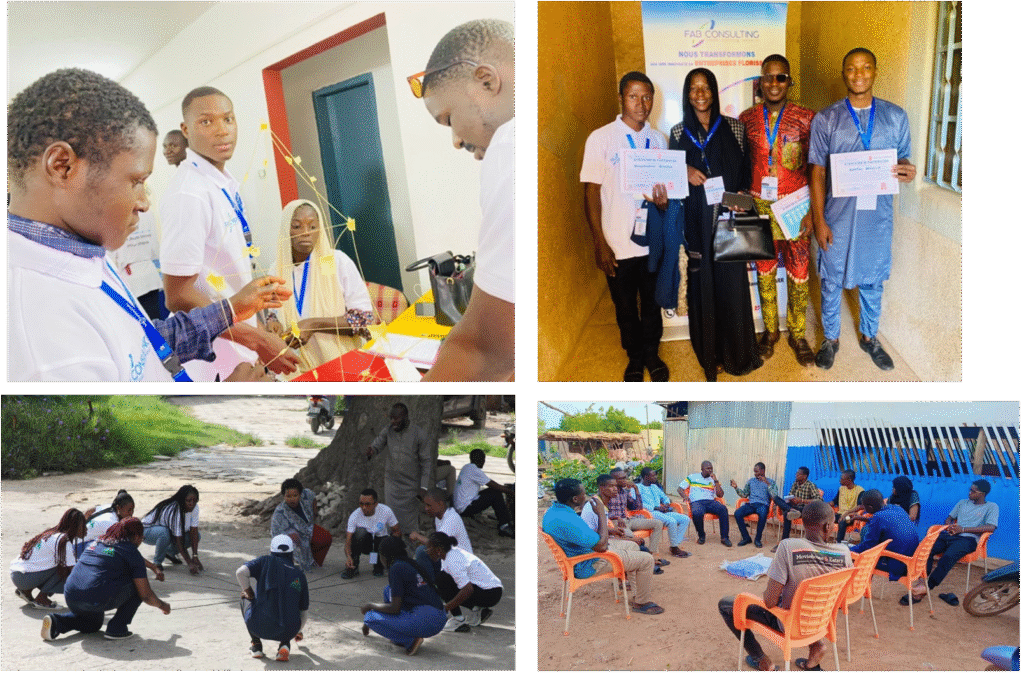
The problem and Motivation Behind:
“In the Ségou region (Mali), most young people are frustrated because they’re jobless. They really want to find a job. That’s why we decided to propose trainings to strengthen their capacities and facilitate their employability.” – Souleymane.
Souleymane Sogoba (29-year-old) and his team witnessed firsthand how unemployment became a persistent and growing challenge among youth in their communities. They have personally experienced the difficulties of being a graduate without a job, and he knows the impact of unemployment on young lives. In the Ségou region of Mali, many young people, despite having completed their education, remain jobless. This situation leaves them feeling frustrated and economically insecure. The lack of decent employment opportunities has not only hindered economic development but also affected the well-being and motivation of young people.
The Innovative Solution
“We decided to propose trainings to these young people in order to strengthen their capacities and facilitate their employability.” – Souleymane.
When Souleymane and his team joined the Youth Innovation Lab, they chose to address the problem of youth unemployment. They applied the Design Thinking process to develop their solution. They started by empathising with young job seekers in their community—many of whom expressed feeling stuck, uncertain, or unsupported in their efforts to find work. They found out that young job seekers lack experience and skills that make them qualified to get access to available employment opportunities or to start their own businesses. Then, the team brainstormed ideas such as employment-focused coaching, training and mentorship, to help youth navigate the world of work. They developed a prototype for their solution, Emploi Vert – equipping young people through targeted training, coaching and mentorship to enhance employability and develop entrepreneurial skills.
Although Souleymane and his team did not have secured a physical office or sustained funding, they continued to organise informal activities and connect youth with the resources available to them. They began organising small-scale trainings and information exchange sessions with young people. These sessions not only offered skills development but also linked participants with potential employers.
Lessons Learned and Addressing Challenges
“Thanks to the lab, I was able to meet with other young people—motivated young people …Simply because we help one another—we collaborate, we share tips, we even share job opportunities. That’s why I think it’s important to stay connected. And up until today, we’re still in touch.” – Souleymane.
Besides learning Design Thinking and project planning, the Youth Innovation Lab enabled Souleymane and his team to network with other like-minded youth and learn from them. They emphasised the importance peer support, as staying connected with other young innovators has helped him stay motivated and inspired.
One of the primary challenges has been the lack of financial resources to establish a physical office and sustain ongoing activities. While the team remains motivated, they struggle to maintain their activities even at smaller scale with their own available resources.
Next Steps and Future Aspirations
“Our dream is to make Emploi Vert a model for youth employment in Mali” – Souleymane.
Looking ahead, the Emploi Vert team plans to secure funding to establish an office and formalise their training services. They aim to expand their outreach and provide more structured support to youth in the region, particularly those with entrepreneurial ambitions.
The next steps include:
- Securing funding to establish a permanent office.
- Scaling up training sessions to cover more communities.
- Launching a formal mentorship programme with local entrepreneurs.
- Developing partnerships with vocational institutes to diversify training content.
Another challenge has been maintaining engagement among youth who often feel demotivated due to past failed job searches. To address this, the team prioritises motivation and practical outcomes, ensuring that training sessions include both skill-building and tangible opportunities.